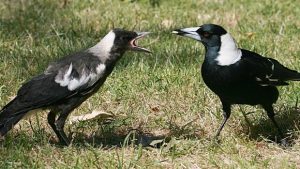Magpies have a reputation for being thieves, but science reveals a very different behavior: they feel a strong distrust towards unknown objects. This “neophobia” could be exploited by other birds to protect their nests from these predators, according to a study published in Royal Society Open Science.
Norwegian researchers tested this hypothesis by placing quail eggs in artificial nests exposed to magpies and crows, in different environments. Some nests were left plain, while others included a metal spoon or white chicken feathers. The result was clear: birds took longer to attack decorated nests. In the case of magpies, the delay was almost two days longer than with simple nests.
This behavior contrasts with the popular image of the magpie as a collector of shiny objects, portrayed in comics like Tintin and in the opera La gazza ladra by Rossini. But in reality, these birds —and other corvids like crows and jays— often avoid the unknown as a defense mechanism, despite their intelligence and problem-solving skills.
The crows in the experiment, slightly bolder due to their frequent contact with urban garbage, also showed some reluctance, albeit to a lesser extent. According to the researchers, the presence of competition among crows in landfills may have motivated their faster behavior, compared to the magpies that acted in quiet territories. The study suggests that the use of human objects in nests not only serves as decoration or a status signal, but could be an effective defensive strategy. A small spoon or some feathers, apparently, can make the difference between losing or saving the eggs.

Why are magpies believed to be thieves?
The belief that magpies are thieves is a popular myth that has been perpetuated through popular culture, including folklore, comics, and operas. However, science has proven this belief to be false.
Reasons behind this belief
- The idea that magpies steal shiny objects for their nests is so ingrained that it appears in the RAE dictionary.
- In German folklore, magpies were considered birds of ill omen and mischievous.
- In Rossini’s opera La gazza ladra, the young Ninetta is a maid accused of stealing a silver spoon that was actually taken by a magpie.
Why science debunked this myth
- A study by the University of Exeter showed that magpies feel nervous around unknown objects, probably because they are new and could be dangerous.
- Researchers placed piles of edible nuts just 30 cm away from shiny objects covered in matte blue paint.
- Magpies picked up a shiny object only twice and immediately discarded it.
Source: AFP.

